ICE

The highest calling of our civil government is to enable people to flourish, secure in communities with liberty and justice for all. In pursuit of that goal, they must at times take appropriate action in pursuit of public safety. However, as the recent police shootings in Chicago and elsewhere have shown, civil servants can commit injustices in the pursuit of their goals. I fear that this happened last March when U.S. Immigration and Customs Enforcement (ICE) arrested more than 2,000 “criminal aliens” in a sweep it called Operation Cross Check. I fear it is happening again in recent raids to deport Central American women and children seeking asylum and safety from violence.
Three protestors — two white, one Latina — were arrested March 19 for chaining themselves to cars and blocking traffic headed to a Donald Trump rally, reports .Mic.
Of the three, only one was transferred to Immigration and Customs Enforcement (ICE) to investigate her legal status. And guess which one it was.
With chants of “Hey, Obama, don’t deport my mama!” and "Que queremos? Justicia! Cuando? Ahora!" a diverse group of immigration activists and leaders made their way from St. John’s Episcopal Church at Lafayette Square to rally at the White House on Tuesday. They were there to demand that the Obama administration stop deporting Central American asylum seekers and instead grant them Temporary Protected Status. With them they carried boxes full of more than 136,000 petition signatures calling for the same.
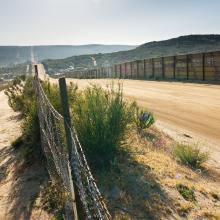
Due to a sudden wave of ICE raids and deportations of asylum seekers fleeing violence in Central America, the White House has faced anger from numerous Democrats in Congress, who drafted a letter denouncing the raids. This new refugee plan, which sets up screening facilities in Central America, aims to reduce human smuggling as well to slow the flow of undocumented immigration.
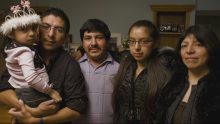
On the day Sam and Elida we to be deported, I arrived at the airport, with the entire Mejia family, and was witness to one of the most intensely sad events I’ve ever seen: a mother and father saying goodbye to their children, not knowing when they would see them again. As I drove home from the airport that night, I thought to myself, if every politician, faith-leader, and citizen in the U.S. could have met the Mejia family, and then seen the family ripped apart, the U.S. would not be deporting hundreds of thousands of immigrants every year. The raids that are descending on immigrant communities right now, targeting Central American families who recently crossed the border escaping extreme violence, would most likely not be happening. The de-humanizing term ‘illegal alien’ would not proliferate across our airwaves.

Every year, U.S. authorities hold over 400,000 suspected immigration violators in 250 jails and detention centers across the nation . Anyone suspected of violating immigration law — including permanent U.S. residents, asylum seekers, pregnant women, victims of torture and children — are subject to mandatory detention without trial and are often held indefinitely for weeks, months, or even years. Ruiz’s story is a testament to the brokenness of the immigrant detention industry.
Although the U.S. government has the right to exercise authority over its borders, it also has legal and moral obligations to protect the human rights of immigrants. From a Christian ethics perspective, it is our obligation to welcome the stranger, provide sanctuary to our brothers and sisters in Christ, and work towards the liberation of all. Mandatory immigrant detention not only deprives people of their dignity — it is also illegal, ineffective, and inhumane.

What now?
This question hangs in the air, ever-present among us after weeks of our time, energy, prayer, and hope were focused on the release of Pastor Max Villatoro. We dared to believe that Max would be returned to his family, to his church, and to his community. But on March 20, the beloved pastor, husband, father, and Iowa City community leader was deported to Honduras. And we are all devastated.
For the last several weeks, members of Central Plains Mennonite Conference (Max’s regional network of churches), Mennonite Church USA (his national denomination), and others from across the country signed petitions, made phone calls, rallied, and made speeches in support of Pastor Max. But despite these efforts, Immigration and Customs Enforcement remained unmoved.
Max was taken into ICE custody on the morning of March 3 just outside his home. He was held for more than two weeks before being sent back to Honduras where he grew up. Max’s childhood years were difficult as his family was poor – a typical situation in a country where the average annual income is $2,070. As a teenager he traveled alone to the city to continue his education, but this proved to be impossible due to financial constraints. At age 20, Max decided to risk the dangerous journey to the United States. And he’s lived here for more than 20 years.

On Aug. 7 we lit a single white candle at the prayer service welcoming Rosa Robles Loreto into sanctuary at Southside Presbyterian Church in Tucson, Ariz. Almost 90 days later, that candle has been joined by five others, representing Luis Lopez Acabal, Beatriz Santiago Ramirez, Francisco Aguirre, Francisco Perez Cordova, and Arturo Hernandez. We are grateful that Beatriz was just granted a stay so that she could return to her home with her two small children, but the rest all remain in sanctuary.
As we approach Rosa’s 90th day in sanctuary, its time to replace the nearly burned down candle, but the light of radical Christian hospitality continues to not only burn bright, but spread throughout the nation.
On Friday, Immigration and Customs Enforcement (ICE) announced a new guidance for its officials when detaining non-criminal undocumented parents with minor children. The new policy seeks to safeguard parents and reduce family separation. ABC News reports:
“It clarifies that ICE officers and agents may, on a case-by-case basis, utilize alternatives to detention for these individuals particularly when the detention of a non-criminal alien would result in a child being left without an appropriate parental caregiver,” said Brandon Montgomery, a spokesperson for ICE.
Read more here.
For the past 19 years I’ve worked and lived in inner city East Dallas among very poor individuals and families. CitySquare, the faith-based non-profit that I lead, last year served more than 50,000 different individuals. We work hand-in-hand with low-income people to see life improved and turned toward real, lasting, legitimate opportunity. Our day-to-day work involves hunger relief and nutrition improvement, health care delivery, wellness programs, legal services, housing options, workforce training and job placement, public policy initiatives, and community organizing. It has been in this dynamic context that we’ve become very involved in advocating for comprehensive immigration reform.
Over half of our friends and neighbors who come through our doors seeking a better life are undocumented residents. Since our entire approach to the community is based on building strong, personal connections and relationships across and beyond the typical barriers of income, gender, race, and religion, we’ve become very aware of the plight, the needs, and the rights of our immigrant friends. Tens of thousands of residents of the Dallas metro area need the relief that comprehensive immigration reform promises.

Five year-old Tony Amorim sat with his dad in a van in Danbury, Conn., in 1989.
“Do you want to come with me,” his father asked him, “or do you want to stay with your mother?”
Tony loved them both, but the boy couldn’t imagine living without his father.
“I want to go with you,” Tony answered.
Right then and there Tony’s father drove away and took him to the far-away land of Florida.
Last week, I interviewed Tony, now 28, on the phone. I couldn’t call him directly because he is in Norfolk County Correctional Center awaiting his deportation hearing scheduled for today.
Tony’s voice was tight. He was eager to share his story — his whole story.
On the face of it, his case is simple. According to a Notice to Appear, issued to him by the Department of Homeland Security, Tony is a native and citizen of Brazil who entered the U.S. through Orlando, Fla., on a Nonimmigrant Visitor for Pleasure Visa in 1985. In 1995, Tony was granted Lawful Permanent Resident status by an immigration judge. He was 11 years old. In 2004 he was arrested and convicted for possession of narcotics. Four years later he was arrested and convicted again for possession of narcotics with intent to sell and for possession of a pistol.
It sounds like Tony is the poster child for the kind of person who should be deported: two felony convictions and possession of a gun. But you haven’t heard the whole story.
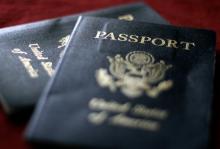
The debate over immigration policy and border security often focuses on the border shared by the United States and Mexico. However, The New York Times recently offered a revealing and troublesome picture of efforts by the U.S. Border Patrol along the dividing line between the US and Canada.
According to the report, the border agents “hover outside the warehouse where Mexican immigrants sell the salal they pick in the temperate rain forest. Sometimes they confront people whose primary offense, many argue, is skin tone.”
This just in from the Associated Press:
"The Obama administration said Monday it arrested more than 3,100 immigrants who were illegally in the country and who were convicted of serious crimes or otherwise considered fugitives or threats to national security. It was part of a six-day nationwide sweep that the government described as the largest of its kind."
The sweep involved more than 1,900 U.S. Immigration and Customs Enforcement officers and agents. According to ICE, more than 1,000 of the people arrested had multiple criminal convictions. The totals included an estimated 50 gang members and 149 convicted sex offenders, other serious offenses included murder, manslaughter, drug trafficking and sexual crimes against minors. It appears to be a response to earlier suggestions that ICE would not vigorously pursue immigrants who are veterans, elderly, lived in the U.S. since they were children, or have relatives who are citizens of legal residents.
The mix of the modern and the medieval in the life of restricted life of Saul Timisela is dizzying.
Global positioning satellites track every move the Indonesian immigrant makes while he seeks refuge in a church, claiming the centuries-old right of sanctuary from the reach of secular authority — in his case, the federal Bureau of Immigration and Customs Enforcement.
To ICE spokesman Harold Ort, Timisela is an "immigration fugitive" who's trying to avoid deportation. But to the Rev. Seth Kaper-Dale, pastor of the Reformed Church of Highland Park, Timisela is "walking with Christ into a conflict with power."
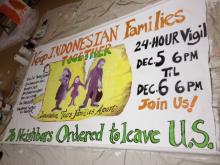
The day before the Rev. Seth Kaper-Dale was supposed to meet with U.S. Immigration and Customs Enforcement (ICE) officials, a tragedy occurred — one more Indonesian immigrant from his congregation was deported.
Like many of his fellow Christian brothers and sister who arrived in the United States in the late 90's and early 2000's, Ferdy Warouf fled Indonesia because of a rise in Islamic extremism that threatened the lives of the Indonesian Christian community.
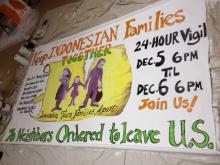
The Rev. Seth Kaper-Dale, a New Jersey pastor who granted sanctuary to an Indonesian immigrant, is scheduled to meet with a U.S. Immigration and Customs Enforcement public advocate on March 20.
But Kaper-Dale said he remains skeptical given the wording in the invitation.
“It’s an invitation to talk, but [says] ‘you’re breaking the law,’” he said.
Saul Timisela—who fled to the U.S. to escape religious persecution 14 years ago—has now lived in the Reformed Church of Highland Park in Newark, NJ for two weeks, avoiding deportation.
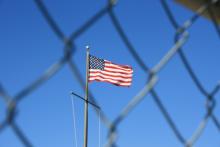
HIGHLAND PARK, N.J. — Saul Timisela was ordered to report to U.S. Immigration and Customs Enforcement in Newark early on the morning of March 1 to be deported.
Instead, the Indonesian Christian took sanctuary at the Reformed Church of Highland Park, where the Rev. Seth Kaper-Dale is trying to save a group of Indonesian refugees who fled their country to escape religious persecution more than a decade ago.
Timisela may have felt safe given ICE's historical reticence to raid churches where illegal immigrants are being harbored. But at the same time, he was sorry to say goodbye to his wife of 10 years — another Indonesian Christian who's also in hiding because she has overstayed her visa and does not have an open case with the immigration agency.
The District of Columbia has no voting representation in Congress, and our city government hasn't always been the best. But yesterday, D.C. Mayor Vincent Gray issued a new executive order reaffirming and strengthening previous policies that District police and other public agencies will not cooperate with Immigration and Customs Enforcement. Under the policy, D.C. police will not ask questions about the immigration status of someone arrested, and will not enforce ICE detainers against someone who has not committed another crime.
When President Barack Obama laid out his deficit plan Monday, he wasn't just trying to sell a policy. When he pressed for tax hikes on the rich and announced, "This is not class warfare," he was trying to exorcise a demon that has bedeviled the Democratic Party for decades and in the process deprive the Republicans of one of their trustiest weapons. The reaction from the right was swift and sure: "Class warfare!"
Wall Street has been devastating Main Street for some time. And when the politicians -- most of them bought by Wall Street -- say nothing, it's called "responsible economics." But when somebody, anybody, complains about people suffering and that the political deck in official Washington has been stacked in favor of Wall Street, the accusation of class warfare quickly emerges. "Just who do these people think they are," they ask. The truth is that the people screaming about class warfare this week aren't really concerned about the warfare. They're just concerned that their class -- or the class that has bought and paid for their political careers -- continues to win the war.
So where is God in all of this? Is God into class warfare? No, of course not. God really does love us all, sinners and saints alike, rich and poor, mansion dwellers and ghetto dwellers. But the God of the Bible has a special concern for the poor and is openly suspicious of the rich. And if that is not clear in the Bible nothing is.